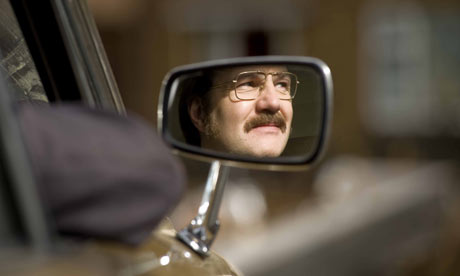
Forthcoming adaptations of the work of novelist David Peace, for both the big and small screen, will probably reinforce a sneaking suspicion that the past is not merely a foreign country, but a really horrible one where you wouldn't want to linger. Peace's The Damned Utd is the story of Brian Clough's bizarre and dysfunctional spell managing Leeds United in 1974 for just 44 days: the forthcoming film version is to star Michael Sheen as Clough himself.
Before that, Peace's Red Riding Quartet of novels – contracted into a trilogy of TV dramas set in Leeds and around Yorkshire, the episodes being set in 1974, 1980 and 1983 – begins on Channel 4 tonight, and very gripping it is too. The separate dramas show a murky mess of official corruption and paranoia, linking the police, local authorities, newspapers and construction companies in an occult web.
The runaway success of Life On Mars has re-ignited our fascination with the murky, unfunny 70s, a fascination which has been a media staple since the 1990s, and probably well before that. Red Riding does something similar – though without the gentle, emollient sense that the coppers are, underneath it all, lovably non-PC characters. It certainly insists on how dark and gloomy and oppressively smoky most interiors of public buildings and officers were in the 1970s – and also how this sweaty men's world could be casually violent, like a prison yard or a school yard. Those were the days when you might get a bit of a clump, almost as a kind of initiation, and there was no one to complain to.
I was reminded of the famous story of Brian Clough saying to his centre-forward, Nigel Jenson, in the dressing room: "Have you ever been punched in the stomach, young man?" (The phrase "young man" might have been added on in the telling, in a Mike Yarwood-ish kind of way.) Jenson said no; Clough duly punched him. And that anecdote in turn reminded me of veteran BBC man John Simpson getting punched in the stomach by Harold Wilson in 1970, for daring to ask if he was going to call an election. In those days, you didn't press charges – presumably no one would believe you, and those that did would think you were a contemptible weakling and tell-tale. A very messed-up, male world.
Yet for all the brilliance of David Peace, and the thrilling entertainment factor of the forthcoming adaptations, I wonder if we can't look at this decade with slightly less exoticism, less horror, fascination and dismay.
There is a sketch I remember by Richard Herring and Stewart Lee in which the traditional naff awfulness of the 1970s is recounted but then Richard tells Stewart that the 70s were also the time when environmentalism was first discussed, when feminism became a vibrant new way of challenging the stale mediocrity of the powers that be, and when theatre and independent cinema also flowered. Perhaps we could have some drama which portrays the 70s in a better light. But maybe it wouldn't be so exciting.

